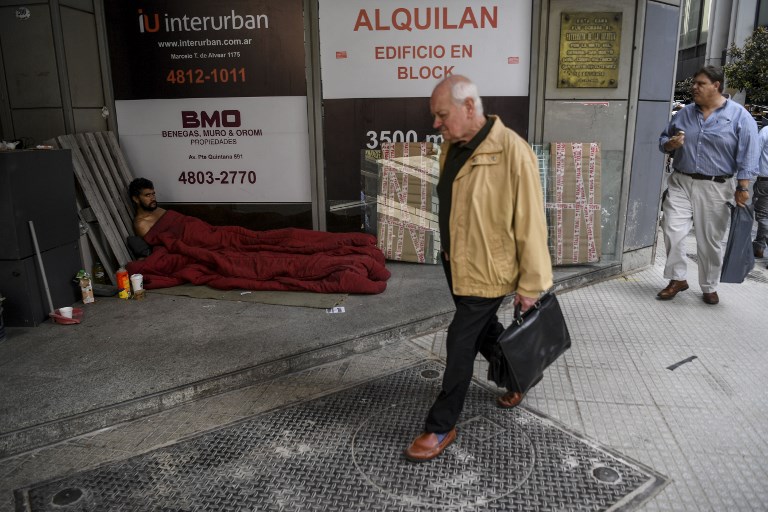
A crisis of confidence beginning in April saw the value of the peso plunge, with Argentina negotiating its $50 billion bailout loan from the IMF. The central bank hiked interest rates to a world-high 60 percent and the peso has remained largely stable since its sudden crash in August. / AFP PHOTO
by Alina DIESTE / with Alexandre PEYRILLE in Buenos Aires
Agence France Presse
NEW YORK, United States (AFP) — The International Monetary Fund has agreed to increase its crisis loan package aimed at restoring confidence in Argentina’s struggling economy by $7.1 billion to $57.1 billion, the South American country’s Finance Minister Nicolas Dujovne said on Wednesday.
The agreement “will allow our country to leave behind the turbulent path of recent months,” said Dujovne during a press conference with IMF Managing Director Christine Lagarde, on the sidelines of the United Nations General Assembly in New York.
Lagarde said the aim of the program was to help Argentina “face its challenges” and support the most vulnerable populations.
The agreement still needs to be approved by the IMF’s Executive Board and Argentina’s Congress, though.
Argentina originally secured a $50 billion loan back in June, when an initial $15 billion tranche was handed over.
However, last month, President Mauricio Macri revealed he had asked for an accelerated disbursement of the remaining $35 billion, with another $3 billion not due until November and the remainder over the next three years.
The new deal “front loads IMF financing,” the Fund said in a statement, increasing by $19 billion the amount due to be made available up to the end of 2019: a total of $36.2 billion, according to Argentina’s finance ministry.
The ministry said that part of the agreement included a commitment to maintain “spending on social assistance… above 1.2 percent of gross domestic product” in order to “protect the most vulnerable sectors.”
‘Strengthened economic plan’
Lagarde said Argentina has “developed a strengthened economic plan that is aimed at bolstering confidence and stabilizing the economy.”
“A central element of the authorities’ plan will be to reach budgetary balance by 2019.”
The announcement of the agreement comes a day after Argentina changed its central bank president.
Some analysts claimed outgoing head Luis Caputo was at odds with the IMF over Argentina’s monetary strategy, leading to his replacement by Guido Sandleris.
Lagarde said that “persistently high inflation continues to erode the foundation of economic prosperity in Argentina” and to tackle it, the country’s “authorities will shift towards a stronger, simpler, and verifiable monetary policy regime.”
She said Argentina would “contain the supply of money, and keep short-term interest rates at their currently” world-high level of 60 percent, aiming to rapidly bring down inflation, expected to hit 40 percent by the end of the year.
She said the central bank had “agreed to adopt a floating exchange rate regime, without intervention.”
Sandleris confirmed this, but said the central bank would set upper and lower limits and maintain “strict control of growth of the monetary base in order to reduce inflation.”
He said a “new stage” was beginning in which “we’re leaving behind banking interventions and returning to a focus on monetary policy as an anchor.”
Loss of confidence
Argentina’s economic woes were brought on by a rapid loss of confidence in its peso currency from April.
It has lost around 50 percent of its value against the dollar since the start of the year, including 20 percent in a two-day period in August after Macri announced he was seeking to renegotiate the IMF loan.
He has since introduced hugely unpopular austerity measures, including halving the number of government ministries and restoring taxes on grain exports.
Thousands of people took to the streets to protests against the austerity measures on Monday while the country was paralyzed by a general strike on Tuesday.
The peso has largely stabilized since its August slump, although it lost 2.2 percent on Tuesday following Caputo’s resignation and another 1.2 percent on Wednesday to close at 39.45 to the dollar.
If it passes 44 to the dollar, the central bank will intervene by selling up to $150 million a day, whereas if the rate drops below 34, it will buy foreign reserves.
© Agence France-Presse







